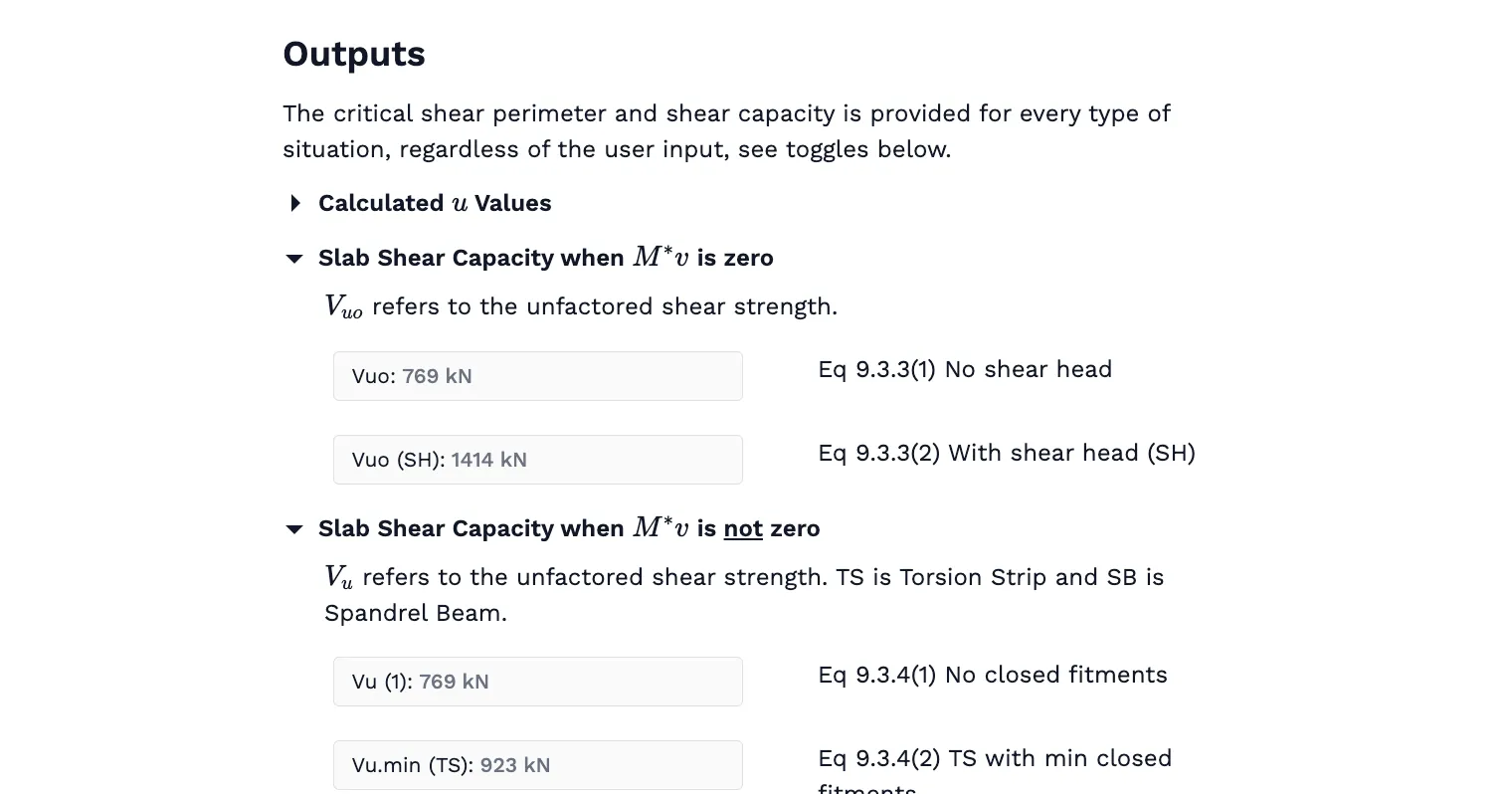Free Concrete Punching Shear Design Tool to AS 3600-2018. Step-by-step, engineering-grade tool with downloadable report.

This template is not available yet. You can sign up and create it yourself!
Or let us know if you'd like to be notified when it’s ready:
About this Concrete Punching Shear Design to AS 3600-2018 Calculator
Punching shear is a critical failure mode in slabs where concentrated loads or columns push through the slab.
This Concrete Punching Shear Design to AS 3600-2018 tool calculates the shear capacity of a suspended flat slab subjected to a concentrated load, commonly referred to as "Punching Shear." Designed to align with the AS 3600-2018 standard, this tool provides a rigorous, standards-compliant assessment of punching shear capacity for concrete structures.
Ideal for:
- Structural engineers use this calculator to assess slab strength and confirm compliance with design code requirements.
- Construction engineers rely on it to validate slab thickness, reinforcement, and drop panels before on-site work.
- Design consultants check preliminary slab designs quickly without manually running through every punching shear equation.
The tool delivers engineering-grade accuracy, automatically calculating critical section dimensions, loads, and reinforcement requirements for reliable results.
Introduction to Concrete Punching Shear Design to AS 3600-2018
What is punching shear?
Punching shear occurs when a slab fails around a column or concentrated load in a cone-shaped failure plane. This shear failure is brittle and can happen without warning, making it essential to calculate punching shear capacity correctly.
Critical section and slab details
AS 3600 defines a critical section at a set distance from the column face—typically 2d (twice the slab effective depth). This section is where calculated punching stresses are compared to code-based limits. Factors like slab thickness, column dimensions, and torsion strips directly influence results.
Punching shear capacity and reinforcement
Punching shear capacity is calculated based on the slab’s concrete strength, depth, and reinforcement layout. When the calculated shear capacity is insufficient, designers may introduce shear reinforcement—stirrups, studs, or shear heads—to increase strength and meet code requirements.
Design loads and code requirements
Loads on the slab include dead loads, live loads, and point loads from columns or equipment. Australian Standards require engineers to consider bending moments, deflection control, and minimum reinforcement to ensure the slab behaves as intended under service and ultimate limit states.
Common Calculation Errors to Avoid
- Using the wrong critical section leads to underestimating punching shear demand and an unsafe design.
- Ignoring torsion strips or drop panels can cause inaccurate shear capacity calculations.
- Failing to check minimum slab thickness results in designs that don’t satisfy deflection limits or capacity requirements.
- Confusing ACI 318 and AS 3600 provisions can lead to incorrect shear reinforcement spacing or calculated values.
- Not considering concentrated load positions relative to edges or walls can produce the wrong shear model and unsafe conclusions.
Engineering templates
Common calculators
Design guides
FAQs
What factors influence punching shear capacity the most?
The key factors are slab thickness, concrete strength, reinforcement ratio, and column dimensions. Any change in these inputs can drastically shift the calculated punching shear capacity.
When do I need shear reinforcement like studs or shear heads?
If the calculated punching shear stress exceeds the code limit for concrete alone, reinforcement is required. Options include shear heads, torsion strips, or stud rails.
How does AS 3600 differ from ACI 318 for punching shear?
While both codes define similar principles, AS 3600 has its own equations, limit states, and reinforcement detailing rules. Engineers working in Australia must design strictly in accordance with Australian Standards.
Can the calculator handle edge columns or wall intersections?
Yes, the calculator accounts for different boundary conditions, including slabs near walls or slab corners, by adjusting the critical section and load distribution model.
Summary and References
Punching shear design to AS 3600-2018 ensures reinforced concrete slabs can resist concentrated loads without brittle failure. Engineers rely on calculators like this to determine slab capacity, calculate reinforcement needs, and check compliance with Australian Standards.
References:
- Australian Standard AS 3600:2018 Concrete Structures
Learn about the benefits of using CalcTree on engineering projects!





